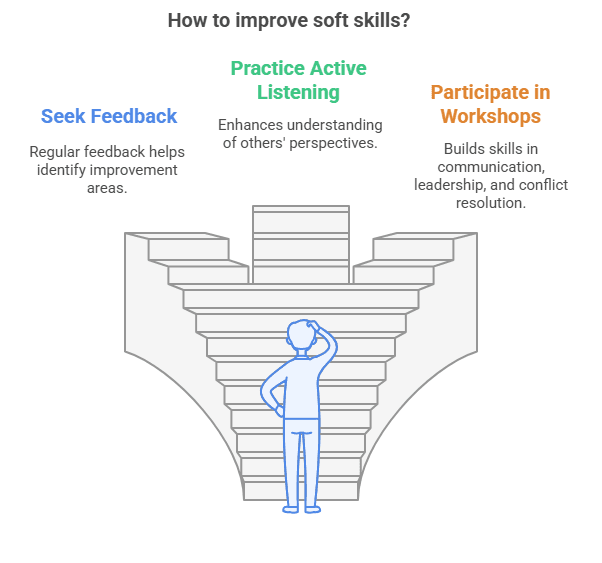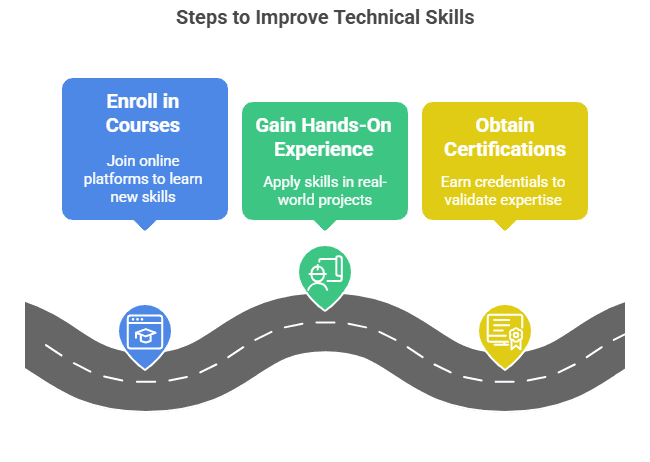Soft Skills vs. Technical Skills: What is Important?
Soft Skills vs Technical Skills: The debate between soft skills and technical skills remains a real discussion. Organizations worldwide seek individuals who can balance these two sets of skills to thrive in competitive environments. This article delves deeply into both skill sets, analyzing their importance and how to cultivate a winning combination.
What Are Soft Skills?
Soft skills refer to personal attributes, interpersonal abilities, and communication techniques that shape how individuals interact with others. These skills are less tangible and harder to measure but are critical for collaboration and leadership. Examples of soft skills include:
- Effective communication
- Problem-solving
- Teamwork
- Adaptability
- Emotional intelligence (EQ)
- Time management
Soft skills are often transferable across industries, making them valuable assets in any role. For example, an employee’s ability to resolve conflicts or present ideas persuasively can significantly impact workplace harmony and productivity.
What Are Technical Skills?
In contrast, technical skills are job-specific abilities acquired through education, training, or practice. These skills are measurable and directly related to a particular role or industry. Examples include:
- Coding and programming
- Data analysis
- Machine operation
- Software proficiency
- Design and engineering expertise
Technical skills are critical for completing specific tasks efficiently. For example, a data analyst’s ability to use tools like Python or Tableau is essential to their role’s success.
Soft Skills vs Technical Skills
| Attribute | Soft Skills | Technical Skills |
| Definition | Interpersonal and communication abilities that enable effective interaction with others. | Specific knowledge and expertise in a particular field or technology. |
| Acquisition | Developed through practice, experience, and personal growth. | Acquired through formal education, training, and practical application. |
| Transferability | Applicable across various industries and job roles. | Often specific to a particular job or industry. |
| Examples | Communication, teamwork, problem-solving, adaptability. | Coding, data analysis, project management, technical troubleshooting. |
| Importance | Essential for effective collaboration, leadership, and career advancement. | Crucial for performing specialized tasks and meeting technical requirements. |
| Development | Continuous improvement through practice, feedback, and self-reflection. | Ongoing learning and staying updated with advancements in the field. |
Why Are Soft Skills Important?
Soft skills are important for fostering collaboration, resolving conflicts, and building professional relationships. In the modern workplace, where teamwork and remote collaboration are common, soft skills often make the difference between a good employee and a great one.
The Role of Emotional Intelligence (EQ)
Emotional intelligence is a standout soft skill. It involves understanding and managing your emotions while empathizing with others. Studies have shown that professionals with high EQ often excel in leadership positions, as they can inspire, motivate, and guide teams effectively.
Improving Soft Skills

- Seek Feedback: Regular feedback from peers or mentors can highlight areas for improvement.
- Practice Active Listening: This helps in understanding others’ perspectives.
- Participate in Workshops: Attend sessions focusing on communication, leadership, and conflict resolution.
Why Are Technical Skills Important?
Technical skills are non-negotiable in roles that demand specialized expertise. They enable employees to perform tasks efficiently and meet job-specific expectations.
Keeping Up With Industry Trends
In fast-evolving industries like technology, finance, or healthcare, keeping technical skills updated is critical to staying relevant. Certifications and continuous learning are key to maintaining a competitive edge.
Improving Technical Skills

- Enroll in Courses: Platforms like Coursera, Udemy, and LinkedIn Learning offer various technical training programs.
- Gain Hands-On Experience: Apply skills in real-world projects to refine them further.
- Certifications: These add credibility and validate your expertise in specific areas.
Soft Skills vs. Technical Skills: Which Is More Important?
The importance of soft skills versus technical skills depends on the context. Some roles demand technical prowess, while others emphasize interpersonal capabilities. However, in most cases, a balance between the two is ideal.
The Rise of the Hybrid Professional
Employers increasingly value individuals who combine technical expertise with exceptional soft skills. These “hybrid professionals” can execute tasks efficiently while collaborating effectively with diverse teams. For example, a project manager with technical knowledge and leadership abilities can bridge the gap between technical teams and stakeholders.
How Soft Skills and Technical Skills Work Together
In reality, soft and technical skills are complementary rather than opposing forces. Consider these examples:
- A software developer needs technical coding skills to create applications but also soft skills to communicate ideas effectively with clients or team members.
- A teacher requires deep subject knowledge (technical skill) alongside empathy and adaptability (soft skills) to cater to diverse learning needs.
The Future of Skills in the Workplace
The demand for soft skills is on the rise as automation and AI handle more technical tasks. Roles that require human interaction, creativity, and critical thinking will always depend on soft skills. Meanwhile, technical skills will remain vital in industries where expertise and precision are irreplaceable.
Cultivating Both Soft and Technical Skills
To succeed in today’s competitive job market, professionals must focus on developing both skill sets. Here’s how:
For Soft Skills:
- Join Networking Groups: Build relationships and improve interpersonal skills.
- Engage in Public Speaking: Boost confidence and communication abilities.
- Practice Mindfulness: Enhance emotional intelligence by understanding your emotions.
For Technical Skills:
- Take Online Courses: Stay updated with the latest technologies and tools.
- Participate on Events: Test and improve your technical expertise in real-time scenarios.
- Leverage Mentorship: Learn from experts in your field.
Conclusion
The debate between soft skills and technical skills is not about choosing one over the other. Instead, it’s about creating a synergy that enhances overall performance and adaptability. Organizations value employees who bring both technical expertise and interpersonal acumen to the table.
Mastering these skills is a journey, not a destination. By continuously investing in personal and professional development, individuals can remain indispensable in their careers.
207 views



